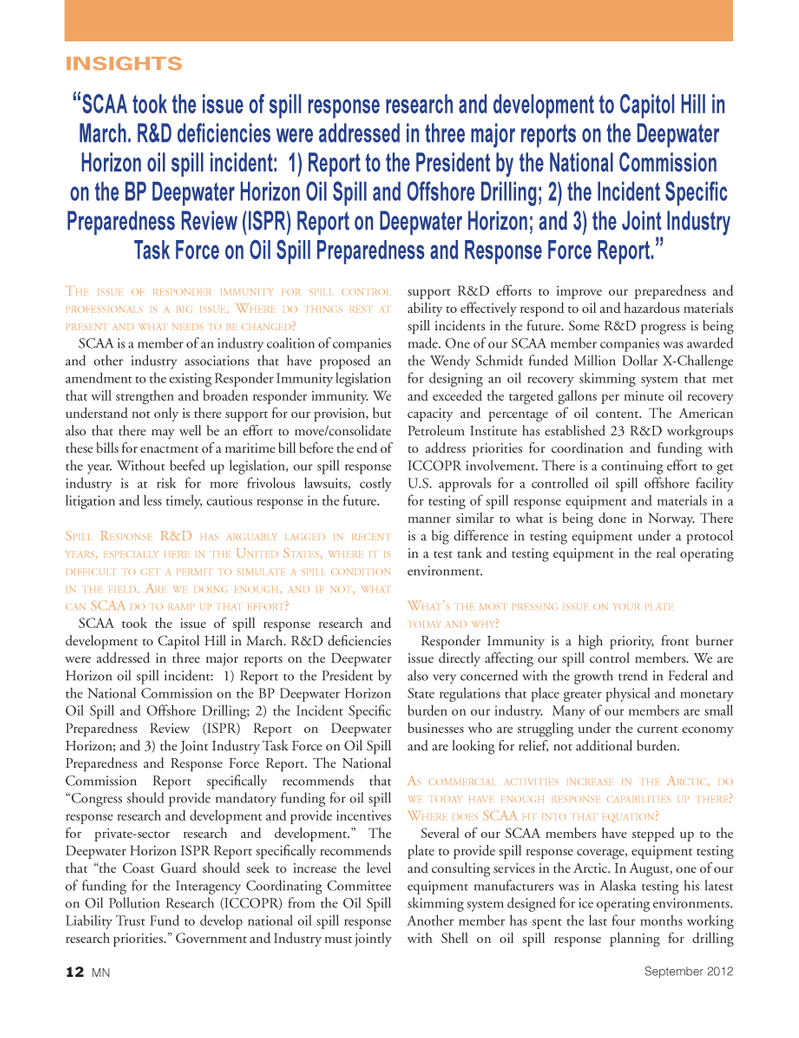
Page 12: of Marine News Magazine (September 2012)
Environment: Stewardship & Compliance
Read this page in Pdf, Flash or Html5 edition of September 2012 Marine News Magazine
INSIGHTSTHE ISSUE OF RESPONDER IMMUNITY FOR SPILL CONTROL PROFESSIONALS IS A BIG ISSUE. WHERE DO THINGS REST AT PRESENT AND WHAT NEEDS TO BE CHANGED? SCAA is a member of an industry coalition of companies and other industry associations that have proposed an amendment to the existing Responder Immunity legislation that will strengthen and broaden responder immunity. We understand not only is there support for our provision, but also that there may well be an effort to move/consolidate these bills for enactment of a maritime bill before the end of the year. Without beefed up legislation, our spill response industry is at risk for more frivolous lawsuits, costly litigation and less timely, cautious response in the future. SPILL RESPONSE R&D HAS ARGUABLY LAGGED IN RECENT YEARS, ESPECIALLY HERE IN THE UNITED STATES , WHERE IT IS DIFFICULT TO GET A PERMIT TO SIMULATE A SPILL CONDITION IN THE FIELD. ARE WE DOING ENOUGH, AND IF NOT , WHAT CAN SCAA DO TO RAMP UP THAT EFFORT ?SCAA took the issue of spill response research and development to Capitol Hill in March. R&D deÞ ciencies were addressed in three major reports on the Deepwater Horizon oil spill incident: 1) Report to the President by the National Commission on the BP Deepwater Horizon Oil Spill and Offshore Drilling; 2) the Incident SpeciÞ c Preparedness Review (ISPR) Report on Deepwater Horizon; and 3) the Joint Industry Task Force on Oil Spill Preparedness and Response Force Report. The National Commission Report speciÞ cally recommends that ÒCongress should provide mandatory funding for oil spill response research and development and provide incentives for private-sector research and development.Ó The Deepwater Horizon ISPR Report speciÞ cally recommends that Òthe Coast Guard should seek to increase the level of funding for the Interagency Coordinating Committee on Oil Pollution Research (ICCOPR) from the Oil Spill Liability Trust Fund to develop national oil spill response research priorities.Ó Government and Industry must jointly support R&D efforts to improve our preparedness and ability to effectively respond to oil and hazardous materials spill incidents in the future. Some R&D progress is being made. One of our SCAA member companies was awarded the Wendy Schmidt funded Million Dollar X-Challenge for designing an oil recovery skimming system that met and exceeded the targeted gallons per minute oil recovery capacity and percentage of oil content. The American Petroleum Institute has established 23 R&D workgroups to address priorities for coordination and funding with ICCOPR involvement. There is a continuing effort to get U.S. approvals for a controlled oil spill offshore facility for testing of spill response equipment and materials in a manner similar to what is being done in Norway. There is a big difference in testing equipment under a protocol in a test tank and testing equipment in the real operating environment. WHAT ÕS THE MOST PRESSING ISSUE ON YOUR PLATE TODAY AND WHY?Responder Immunity is a high priority, front burner issue directly affecting our spill control members. We are also very concerned with the growth trend in Federal and State regulations that place greater physical and monetary burden on our industry. Many of our members are small businesses who are struggling under the current economy and are looking for relief, not additional burden. AS COMMERCIAL ACTIVITIES INCREASE IN THE ARCTIC , DO WE TODAY HAVE ENOUGH RESPONSE CAPABILITIES UP THERE? WHERE DOES SCAA FIT INTO THAT EQUATION ?Several of our SCAA members have stepped up to the plate to provide spill response coverage, equipment testing and consulting services in the Arctic. In August, one of our equipment manufacturers was in Alaska testing his latest skimming system designed for ice operating environments. Another member has spent the last four months working with Shell on oil spill response planning for drilling ?SCAA took the issue of spill response research and development to Capitol Hill in March. R&D deÞ ciencies were addressed in three major reports on the Deepwater Horizon oil spill incident: 1) Report to the President by the National Commission on the BP Deepwater Horizon Oil Spill and Offshore Drilling; 2) the Incident Speci Þ c Preparedness Review (ISPR) Report on Deepwater Horizon; and 3) the Joint Industry Task Force on Oil Spill Preparedness and Response Force Report. ?12 MNSeptember 2012MNSept2012 Layout 1-17.indd 12MNSept2012 Layout 1-17.indd 128/30/2012 2:46:51 PM8/30/2012 2:46:51 PM

 11
11

 13
13
